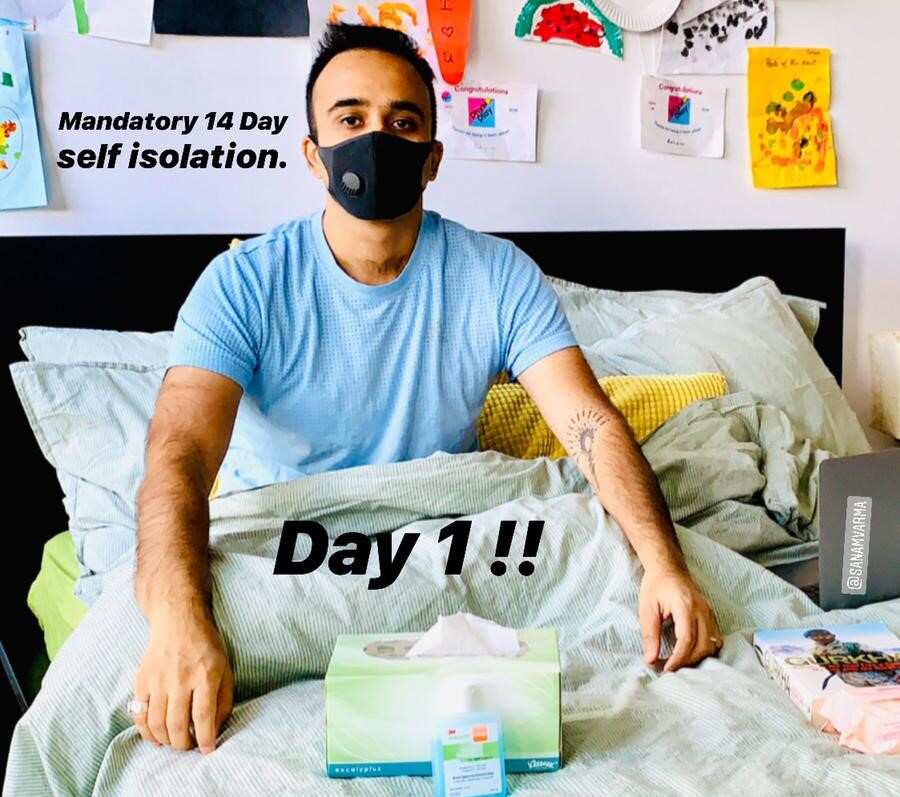Many people brought forward their trips back home after the Department of Foreign Affairs advised Australians last week to return to Australia as soon as possible by commercial means.
Highlights:
- Australia has banned all non-citizens and non-residents from entering the country.
- Self-isolation is compulsory for all overseas arrivals.
- The number of confirmed cases of Coronavirus in Australia has surged past 1,500
Sydney-based Kanishk Verma brought forward his return from India when he learned about the advisory.
“I had travelled to India on 6th March due to a family emergency. I was scheduled to return on 30th March, but when Prime Minister Morrison announced all Australian should return, I preponed my flight,” Mr Verma told SBS Hindi. Kanishk returned to Sydney on Friday, 20th March.
Kanishk returned to Sydney on Friday, 20th March.

Kanishka Verma is in self-isolation after returning from India. Source: Supplied
The journey was different this time, he says.
“Airports were mostly empty both in Delhi and in Sydney.
"Although the flight occupancy was 60 to 70 per cent, passengers and airline staff were extremely cautious on the airport and onboard too. The airport staff and flight crew were wearing masks and gloves.
"Everybody was wearing masks and using hand sanitizer frequently. People were avoiding contacts and taking extra precautions. The tension was in the air.” Mr Verma says he did not face much difficulty at Sydney airport as he was returning from India, which is not a high-risk country.
Mr Verma says he did not face much difficulty at Sydney airport as he was returning from India, which is not a high-risk country.

Source: Supplied
“Some passengers had to undergo special screening, but they let us go after knowing we returned from India. They told us India was not a high-risk nation, so we were allowed in. However, I saw some temporary visa entrants were sent back immediately,” he said.
Australia has banned all non-citizens and non-residents from entering the country.
This might interest you:

Australia's border closure leaves temporary visa holders in a limbo
Under the new travel ban, Australians seeking to return from overseas and their direct family members will still be allowed but must self-quarantine for 14 days upon entry.
“This is about slowing the epidemic. It’s not about stopping it completely. We will have more cases. What we’re trying to do is have less [cases] and over a longer time,” Australia’s Deputy Chief Health Officer, Professor Paul Kelly had told the media last week. Authorities are informing every passenger about the self-isolation rules.
Authorities are informing every passenger about the self-isolation rules.

Passengers arrives at Sydney airport on March 16, 2020 in Sydney, Australia. (Photo by Brendon Thorne/Getty Images) Source: Getty Images AsiaPac
“When I landed in Sydney, we were given a form by the authorities. It was an agreement that we had to self-isolate ourselves for 14 days. They also gave us a pamphlet explaining what self-isolation means and how it works. It also describes in detail the steps need to be taken in case of sickness,” said Mr Verma, who is in self-isolation.
Self-isolation is compulsory for all overseas arrivals. If the laws are breached, people could be fined up to $50,000 or even face prison. Kanishk Verma says his wife and daughter are maintaining proper distance and he is inside his room all the time and using a separate bathroom.
Kanishk Verma says his wife and daughter are maintaining proper distance and he is inside his room all the time and using a separate bathroom.

Grocery bags left at the homes of people choosing voluntary isolation. Source: Supplied
“My three-and-a-half-year-old daughter also comprehends that something is different. Although it is tough for her and she wants to come and play with me. But we are using every precaution possible.
"This is the least we can do in this time of crisis,” he said.
Also on SBS Hindi:

Hindu temples in Australia go online amid Covid-19 outbreak




